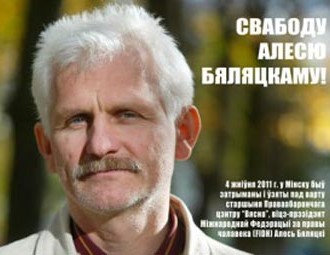Statement on the illegal conviction of Ales Bialiatski by civil society organizations

STATEMENT ON THE ILLEGAL CONVICTION OF ALES BIALIATSKI BY CIVIL SOCIETY ORGANIZATIONS November 25, 2011 November 25, 201On November 24, 2011, Ales Bialiatski, an outstanding human rights defender and one of the founders and prominent leaders of...
STATEMENT ON THE ILLEGAL CONVICTION OF ALES BIALIATSKI
BY CIVIL SOCIETY ORGANIZATIONS
November 25, 2011
November 25, 201On November 24, 2011, Ales Bialiatski, an outstanding human rights defender and one of the founders and prominent leaders of independent civil society in Belarus and the Vice-President of International Federation for Human Rights (FIDH), was unjustly convicted to four and a half years’ imprisonment. Ales, who also heads “Viasna”, the largest human rights organization in Belarus, was found guilty of “tax evasion in especially large amounts” after the Belarusian special services were provided access by the governments of Lithuania and Poland to information on Viasna’s foreign bank accounts, registered in Mr.Bialiatski’s name.
The criminal case against Ales Bialiatski was conducted in an illegal manner from the beginning. Procedural violations could be observed during the investigation and hearing of the case. He was illegally held in custody since his arrest. The investigation ignored directions from the prosecutor’s office and refused to address the organizations that had transferred funds to the accounts of Bialiatski and inquire about the nature of the transfers. There was no interest from the side of the investigation to seek the truth, and no intent from the side of the court to take note of it.
During the hearing it became evident that the genuine reason for prosecution of Bialiatski was his long-term engagement in human rights advocacy in Belarus. During his thirty years of work he has become friends with the many who have suffered from human rights violations in Belarus and has become “enemy number one” for those who sanctioned and committed those violations.
Ales Bialiatski’s conviction is another brick in the wall of repressive politics that has been constructed for decades by the Belarusian state against human rights organizations. The impossibility to obtain registration, criminal prosecution of unregistered organizations, crackdowns, searches, confiscations and arrests of human rights activists have been among the standard practices of the state and have now been joined by yet another repressive mechanism.
We express our deepest indignation towards the sentence imposed on Ales Bialiatski. We are convinced that the criminal case against him has nothing to do with the issues raised by the court. This case is yet another means of pressure on this human rights defender, his colleagues from “Viasna” and the human rights movement in the country on the whole. His sentence is illegal and we demand its cancellation and his immediate release.
We also express our sincere support to Ales and his family. We hope he will soon be freed by a just court and all his charges lifted. We call upon our colleagues in Belarus and abroad, to all those who are not indifferent to injustice, to support Ales Bialiatski and demand his quick release.
-
03.01
-
07.10
-
22.09
-
17.08
-
12.08
-
30.09



























